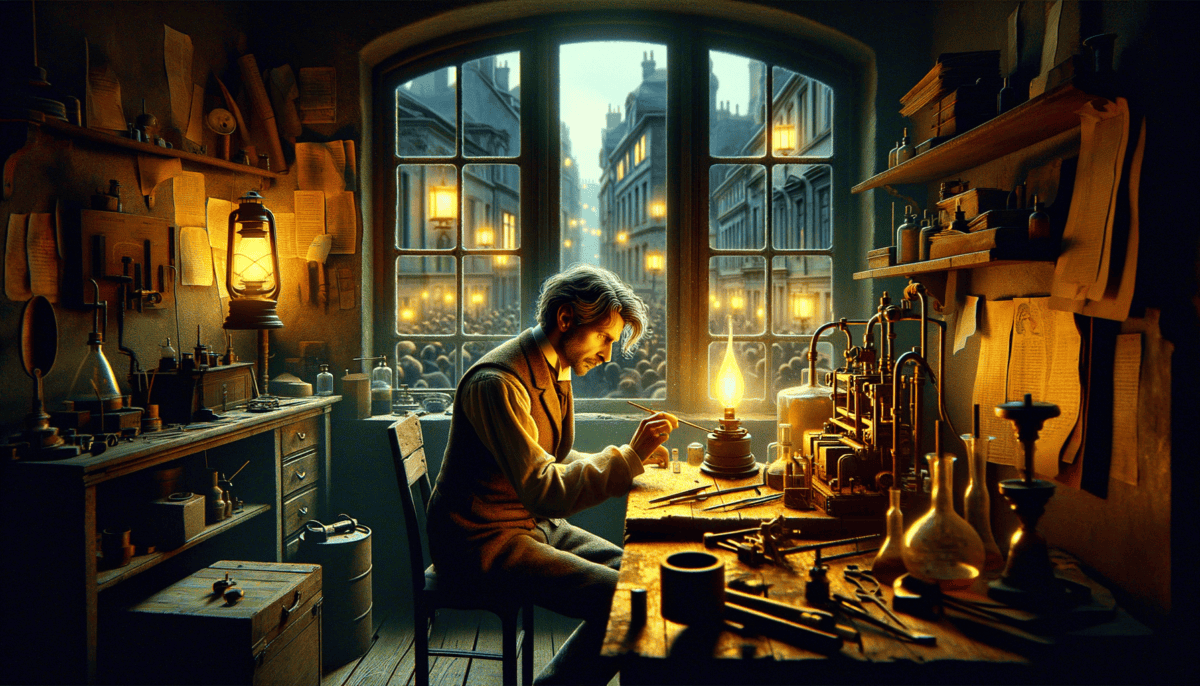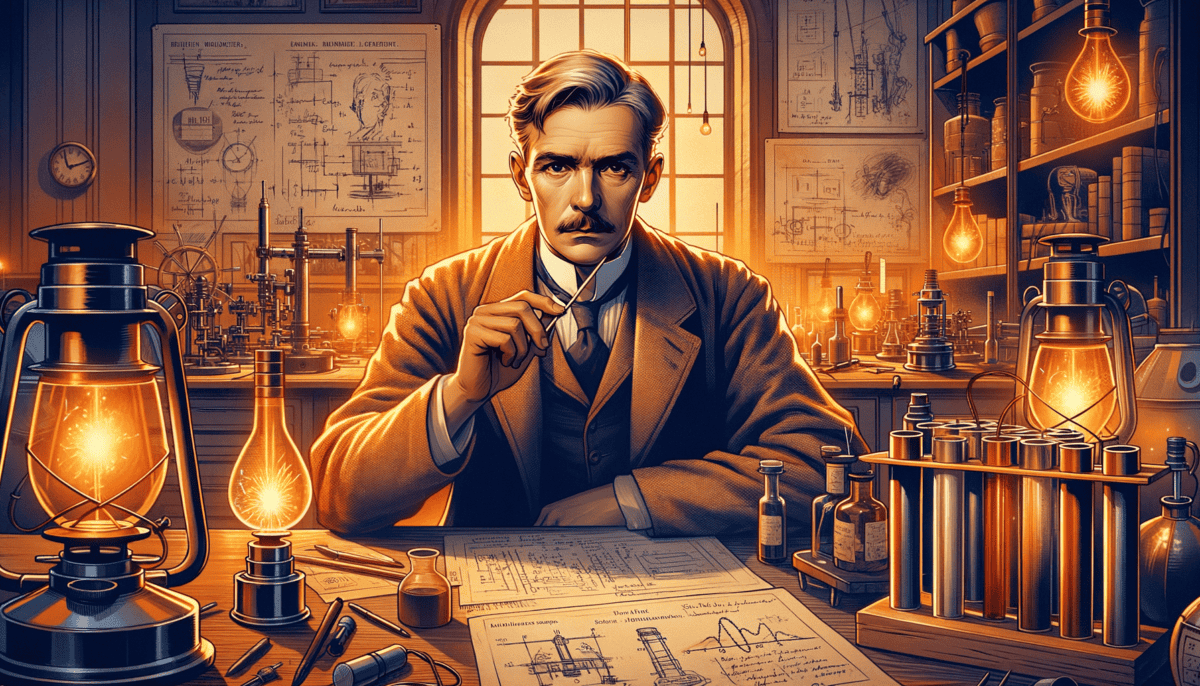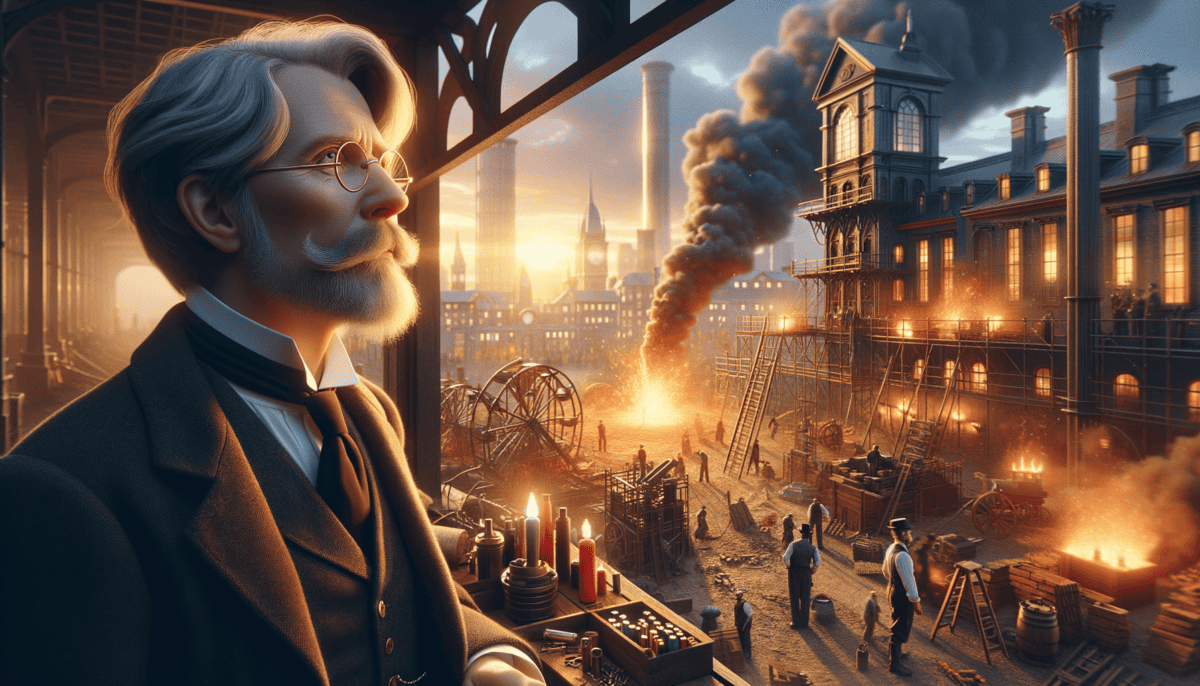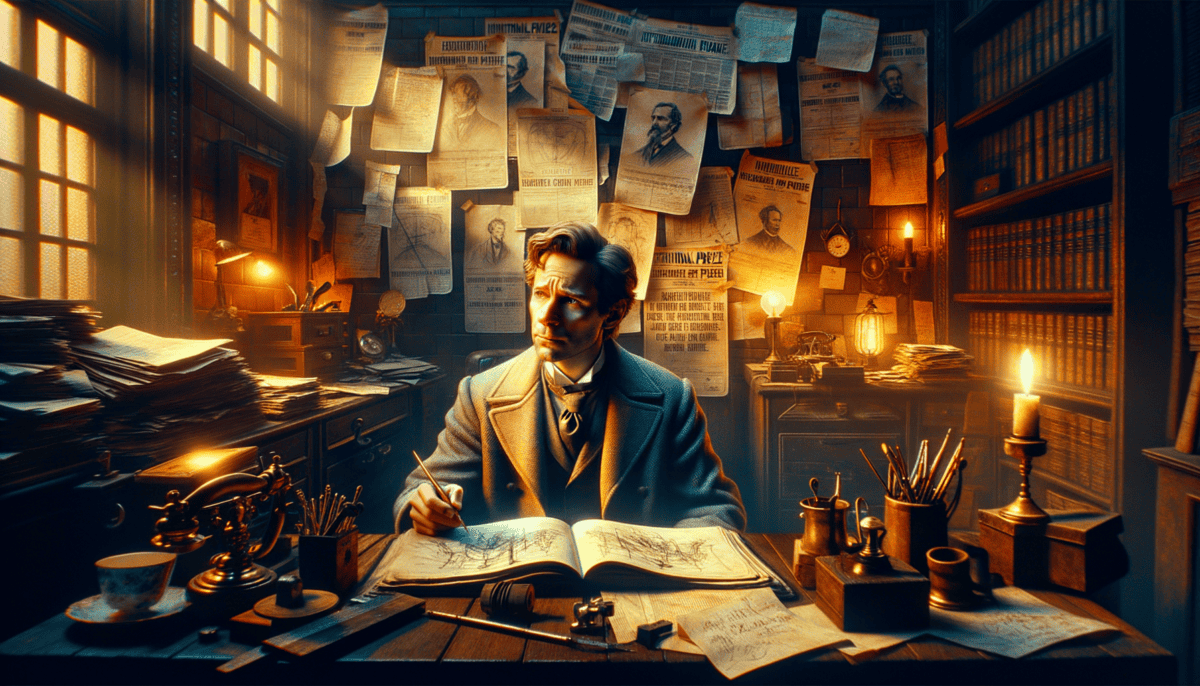A Young Boy’s Dream
Little Alfred Nobel bounced excitedly in his chair as he watched his father work in their small workshop in Stockholm. It was 1839, and eight-year-old Alfred loved nothing more than seeing the magical world of science come alive.
"Papa, what are you making today?" Alfred asked, his bright eyes fixed on the bubbling beakers and colorful liquids.
Immanuel Nobel smiled at his curious son. "Today we're working on something special – a new kind of rubber for machines." He carefully stirred a mixture that smelled like sweet flowers.
Alfred wasn't like other children his age. While they played with toys in the streets of Stockholm, he preferred to read books about science and watch chemical reactions in his father's workshop. The workshop was filled with exciting tools, bottles of strange liquids, and the sounds of bubbling experiments.
"Can I help?" Alfred asked hopefully. His small hands reached for a clean glass beaker.
"Of course!" his father answered. "A good scientist always starts by being curious."
A Family of Dreamers
The Nobel home was different from others in Stockholm. Instead of fancy furniture, they had shelves full of books about science. Rather than expensive paintings, their walls held drawings of machines and inventions.
Alfred's three brothers – Robert, Ludvig, and Emil – were also interested in their father's work. But Alfred showed a special love for chemistry. He would spend hours watching different substances mix and change colors.
"Why does it do that, Papa?" he would ask whenever something exciting happened.
His mother Andriette would sometimes worry. "Be careful with those chemicals, Alfred!"
But his father would say, "Let the boy learn. The world needs people who ask questions."
The Start of Something Big
One day, as snow fell outside their Stockholm window, Alfred made his first real discovery. He had mixed two safe chemicals and created a beautiful blue color that no one expected.
"Look what I made!" he shouted with joy.
His father examined the mixture carefully. "Well done, Alfred! You've discovered something new. That's what scientists do – they find new things that can help people."
Money was tight for the Nobel family. Sometimes they couldn't afford new clothes or fancy foods. But they always found enough to buy books and materials for their experiments.
"Knowledge is worth more than gold," Immanuel would tell his children. "If you learn enough, you can change the world."
Little did young Alfred know just how right his father would be. As he fell asleep each night, his head filled with dreams of future inventions, he was already on the path to becoming one of the world's most famous inventors.
The workshop's strange smells, the exciting experiments, and his father's encouraging words were planting seeds that would grow into amazing discoveries. Alfred's curiosity was just beginning to bloom, like a flower opening up to the sun.
His mother would often find him asleep with a science book in his hands. She would gently take it away and whisper, "Sweet dreams, my little inventor."
And indeed, Alfred's dreams were already taking shape in that small Stockholm workshop, dreams that would one day change the world in ways no one could imagine.
Dark Clouds Gather
Times grew hard for the Nobel family. Money problems forced them to leave their beloved Stockholm workshop behind. Young Alfred’s heart was heavy as they packed up their precious books and equipment.
“Where are we going, Papa?” Alfred asked, carefully wrapping his favorite beakers.
“To Russia, my boy,” Immanuel replied. “We’ll find new opportunities in St. Petersburg.”
A New Workshop
In St. Petersburg, Alfred was now thirteen. His father set up a new workshop where they made tools for the Russian army. The workshop smelled of oil and metal, just like their old one in Stockholm.
Alfred spent more and more time doing chemistry experiments. His younger brother Emil often helped him.
“Be careful with that, Emil,” Alfred would say when they worked with the chemicals. “Some of these can be dangerous.”
Emil looked up to his big brother. “I want to be just like you, Alfred!”
The Terrible Day
One sunny morning, Alfred was working on a special experiment with nitroglycerin. This was a new, powerful liquid that could explode easily. His father had told him to be extra careful with it.
Emil was helping in the workshop that day. Suddenly, there was a loud BOOM! The whole building shook. Black smoke filled the air.
“Emil!” Alfred shouted through the smoke. “Emil, where are you?”
But Emil didn’t answer. The explosion had taken his little brother away forever. Alfred’s heart broke into a million pieces.
A Promise Made
After losing Emil, Alfred couldn’t sleep for many nights. He would sit in the workshop, looking at his brother’s empty chair.
“I promise you, Emil,” he whispered one night. “I will find a way to make these explosives safer. No one else should lose their brother like this.”
Alfred worked harder than ever. He knew nitroglycerin could help people build roads and tunnels. But first, he had to make it safe to use.
Never Giving Up
Many people told Alfred to stop his dangerous work. “It’s too risky,” they said. “Find something else to study.”
But Alfred remembered his promise to Emil. He kept trying new ideas:
• Mixing nitroglycerin with different materials
• Testing it in different temperatures
• Finding ways to make it more stable
“I won’t give up,” he would say while working late into the night. “There must be a way to make this safer.”
Even when experiments failed, Alfred kept going. He wrote in his notebook: “Each failure teaches me something new. Emil would want me to keep trying.”
The memory of his brother pushed Alfred forward. Every day, he got closer to his goal of making explosives that would help build things instead of hurting people.
As the candles burned low in his workshop each night, Alfred thought about Emil. The stars seemed to twinkle with his brother’s spirit, encouraging him to keep working toward his dream of safer explosives. ⭐
The Birth of Dynamite
Alfred wiped sweat from his forehead as he worked in his laboratory. He had been mixing nitroglycerin with different materials for months. Today, he was trying something new – mixing it with a special clay called kieselguhr.
The Magic Mix
“Look at this!” Alfred called to his assistant. “When we mix the nitroglycerin with this clay, it turns into a soft paste.”
He carefully shaped the paste into small sticks. Unlike pure nitroglycerin, these sticks didn’t explode when dropped or bumped. But they still had the same power when needed!
“We’ll call it ‘dynamite’,” Alfred said with a smile. “From the Greek word ‘dynamis’ which means power.”
Testing Time
Alfred needed to show everyone his new invention was safe. He organized a special demonstration at a quarry.
“Watch carefully,” he told the crowd. He dropped a stick of dynamite on the ground. Nothing happened! The crowd gasped.
Then Alfred placed another stick in a hole in the rock. When he set it off on purpose – BOOM! The rock split perfectly.
Helping the World Build
Soon, everyone wanted to use Alfred’s dynamite. It helped build:
• Railroad tunnels through mountains
• Canals for boats
• Roads through rocky areas
• Mines for finding gold and silver
“Emil would be proud,” Alfred thought, watching workers safely use his invention. “We’re helping people build amazing things.”
Fame and Fortune
Letters came from all over the world asking about dynamite. Alfred traveled to many countries to show how to use it safely.
“Remember,” he would tell each group, “this tool is for building, not destroying.”
Money started flowing in from dynamite sales. Alfred used it to build factories where workers could make dynamite safely.
A Dream Come True
One evening, Alfred sat in his office looking at a picture of Emil. “We did it, little brother,” he whispered. “We found a way to make explosives safer.”
But even as he celebrated his success, Alfred didn’t know that his invention would soon bring him both joy and worry. More people wanted dynamite than ever before, and not all of them wanted to use it for building things.
The stars twinkled outside his window as Alfred wondered what new challenges tomorrow would bring. The story of dynamite was far from over… ⭐
A World Changed Forever
The sun rose over a busy construction site. Workers carefully placed dynamite sticks into holes in a mountain. BOOM! The rocks split apart, making way for a new railroad tunnel.
Building Big Dreams
Alfred watched from a hill as workers used his invention. “With dynamite, we can build anything!” he said proudly.
And he was right! People used dynamite to:
• Dig the Panama Canal
• Build the Mount Rushmore faces
• Create tunnels for trains
• Find gold and silver in mines
• Clear land for new roads
Every day brought news of another amazing project using dynamite. ️
A Worried Heart
But one morning, Alfred read something in the newspaper that made his heart sink. Some people were using dynamite to make weapons.
“This isn’t what I wanted,” Alfred whispered. He remembered his promise to Emil about making explosives safer.
Mixed Feelings
“Your dynamite is helping us build great things!” said a happy construction worker.
“But some people are using it to hurt others,” Alfred replied sadly. “I never wanted that.”
He walked through his laboratory, touching the tools and bottles he used to make his great discovery. Was making dynamite a mistake?
Searching for Answers
Alfred couldn’t sleep at night. He kept thinking about how to make things right.
“Maybe I can use my money to help people,” he thought. “To encourage others to build things up instead of breaking them down.”
Looking Forward
One evening, Alfred sat at his desk writing in his journal. “Dynamite has changed the world,” he wrote. “Now I must find a way to change it again – for the better.”
He looked out his window at the setting sun. Tomorrow would bring new challenges, but also new chances to help people. And Alfred Nobel was ready to try something different…
As night fell, he picked up his pen again. An idea was forming in his mind – something that would surprise everyone and change his life forever.
The News That Changed Everything
One morning in 1888, Alfred Nobel opened his newspaper and got the biggest shock of his life. He saw his own name in big letters!
The Harsh Words
Alfred’s hands shook as he read the words. The newspaper called him “The Merchant of Death” because his dynamite was being used to make weapons.
“The man who became rich by helping people hurt each other is dead,” the paper said.
“But that’s not who I am!” Alfred said out loud. His heart felt heavy.
A Time to Think
Alfred walked through his garden, thinking about what he had read. He remembered his brother Emil and their promise to help make the world better.
“What would Emil think of me now?” he wondered.
Making a New Plan
That night, Alfred couldn’t sleep. He sat at his desk with a pen and paper.
“I want to be remembered for helping people, not hurting them,” he said to himself.
He started writing a list of ways he could use his money to make the world better:
• Give money to people who help others
• Support new discoveries in science
• Encourage people who work for peace
A Better Way
“I’ve got it!” Alfred jumped up from his chair. He had an amazing idea that would change everything.
“I’ll create special prizes,” he said. “The biggest prizes in the world! They will go to people who do wonderful things to help everyone.”
Starting Fresh
The next morning, Alfred called his lawyer. “I want to change my will,” he said. “I want to leave my money for something special.”
His lawyer looked surprised. “Are you sure about this, Mr. Nobel?”
“More sure than I’ve ever been,” Alfred replied with a smile. “It’s time to create something that will help people forever.” ⭐
As he looked out his window at the city below, Alfred felt lighter. The newspaper’s mistake had shown him a new path. Now he just had to be brave enough to follow it…
A Gift to the World
Alfred Nobel spent his final years working hard on his special plan. He wanted to make sure his money would help good people do amazing things.
The Special Prizes
Alfred wrote carefully in his will about five different prizes:
• Peace Prize – for people who help stop wars
• Physics Prize – for discovering how things work
• Chemistry Prize – for making new things
• Medicine Prize – for helping sick people
• Literature Prize – for writing wonderful stories
Writing His Final Story
“Everyone deserves a chance to do good,” Alfred said as he signed his will. His hands weren’t shaking anymore. He felt proud of his choice.
His lawyer smiled. “This will change many lives, Mr. Nobel.”
A New Beginning
In 1896, Alfred Nobel died peacefully in his sleep. But his story wasn’t over – it was just beginning!
The first Nobel Prizes were given out in 1901. People from all over the world came to receive their medals.
“This is exactly what Alfred wanted,” said one of his friends. “To help people who help others.”
Today’s Heroes
Every year, special people still get Nobel Prizes. Scientists who find cures for sick people. Writers who tell amazing stories. People who work hard to stop wars.
The Best Memory
Alfred Nobel is no longer remembered as the “Merchant of Death.” Now people know him as someone who helped make the world better.
His prizes help people dream big dreams. They encourage others to work hard and do good things.
The little boy who loved science and wanted to help others finally got his wish. His name now means “hope” and “discovery” to people everywhere.
And just like Alfred Nobel’s prizes, great ideas and good actions can keep helping people forever and ever…






